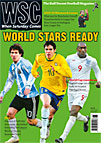 This could be a critical summer at Old Trafford. Ashley Shaw looks at the Glazer protests so far and wonders what lies ahead
This could be a critical summer at Old Trafford. Ashley Shaw looks at the Glazer protests so far and wonders what lies ahead
By the time Manchester United next kick a ball, they could be playing under a benign coalition of wealthy fans, backed by a support confident of a bright future. There would be a fans’ voice at the upper echelons of the club, with a “golden share” allocated to them to ensure that the pillage of the club never happens again. The £790 million debt loaded on to the club will have been assessed and plans put in place to pay it down. Management fees and dividends would be waived in an emergency budget in order that the club return to an even keel. And before an ecstatic crowd, Wayne Rooney’s first act under the new owners would be to take the kick-off, beat every member of the Liverpool team before backheeling the ball into an empty net…
In truth, most of the above sounds like a fantasy – for starters, we’d never play Liverpool on the opening day of the season. Yet there is hope that a well co-ordinated summer campaign might yet prise the club from the Glazers, despite the owners’ insistence that they regard United as akin to living in “the best house at the top of the hill” and plan to see out the current decade.
The announcement in March that a consortium of wealthy backers, tagged the Red Knights, were putting together a deal to buy the club built on the momentum of the initial January protests. Manchester United Supporters’ Trust (MUST) went from just 30,000 members to over 150,000 in the period after the announcement. Events at Old Trafford dominated the news for several days and the sight of David Beckham donning a green and gold scarf following the Milan match made the story international.
Few European football fans can now be unaware of the significance of the colours or the antipathy of United supporters towards their owners. It even inspired Milan fans to launch their own campaign to oust an unpopular owner under the banner “Love AC Milan, Hate Silvio”, following good-natured encounters with United supporters.
Yet two months later there has been no official bid, merely an announcement that something concrete will be forthcoming before the start of the World Cup, by which time season-ticket holders will have had their renewal letters for at least six weeks and the renewal deadline will be only days away. Supporters who hoped that the Glazers’ stay could be curtailed by this campaign now fear that vital momentum has been lost. Most recognise that failure to shift them this summer would be a final failure, leaving them looking even more secure having fought off two fan campaigns.
Nevertheless, the green and gold protests have already had some success – forcing the Glazers to freeze season-ticket prices and making David Gill justify the actions of his paymasters. The campaign, at first dismissed within the club, even got a tacit seal of approval from Sir Alex Ferguson and clearly panicked the owners. The Beckham incident was a coup, as were frequent pictures of celebrating supporters in “Norwich colours” every time United scored.
Yet, even if the Glazers agreed to sell, no one seems to agree how much the club is worth. A Forbes magazine valuation of £1.2bn was well above the figure usually mentioned, of £850m, and that was before the Glazers claimed that they turned down a bid of £1.5bn back in November from the Qatari royal family, who recently purchased Harrods. This could (optimistically) be read as a way of the owners naming a starting price ahead of any future bargaining.
However, it is clear that in order to really force the owners’ hand, supporters will have to undertake a mass season-ticket boycott, the like of which has never been attempted before at a sporting organisation of a similar stature. The next two months will be critical in establishing whether it was all just a flash in the pan and that the potential bidders don’t end up looking more like the Barron Knights, leaving supporters fearful of a future where the manager proclaims “there is no value in the market” at the start of every transfer window as the quality of signings decreases.
For a takeover to stand any chance of success, a significant amount of supporters (over 25 per cent) would need to drop their season tickets. For a business sailing so close to the wind, this drop in cash-flow might force the owners to contemplate the unthinkable, even if the feeling remains that the last bidders they would be willing to deal with are the Red Knights.
From WSC 280 June 2010